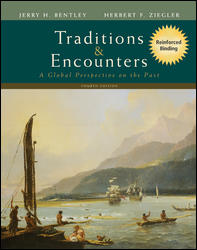Traditions and Encounters, 4th Edition (Bentley)Chapter 39:
THE END OF EMPIREOverviewOne of the most dramatic developments of the postwar era was the rapid breakup of the colonial empires that had dominated the world at the beginning of the century. Between 1945 and 1975, most of the former colonies of Africa and Asia became independent states. (Namibia was the last, in 1990.) A number of forces contributed to the process of decolonialism and helped shape postcolonial societies, including: - Wars of liberation. The road to independence was sometimes amicable, as in Ghana and Morocco, but was often fiercely contested, as in Kenya and Algeria. Colonial powers fought to recover the empires that once attested to their world dominance. Concern for local settler populations also contributed to their resistance. In Vietnam the struggle for national liberation began with resistance to the Japanese during the war and continued afterward against the French.
- Cold war politics. In the global conflict between the United States and the Soviet Union (discussed in Chapter 38), new states were pressured to choose between the superpowers. Foreign aid and military support were often contingent on an alliance. Stronger nations like India presented a third alternative, nonalignment, with limited success.
- Ethnic and religious conflicts. Nationalism was a powerful force in postwar independence movements. In states where the national identity was defined by religion or ethnicity, however, this force could lead to internal and regional conflicts. The partition of India into Muslim and Hindu states did little to ease tensions in that region. The Iran-Iraq war was fueled by both religious and ethnic differences. In sub-Saharan Africa, where national boundaries bore little relation to tribal lands, each new nation was a potential hothouse for ethnic conflict.
- Fragile new democracies. Many of the new states were ill-prepared for self-government, lacking both the institutions and traditions that support democracy. In Sub-Saharan Africa, democratic governments were soon taken over by military dictators, and those states often plunged into prolonged civil wars. South Africa was technically a democracy but, until 1990, only for a small white ruling class. Likewise in east Asia, new states were governed by military regimes until the late 1980s. Notable exceptions to this global retreat from democracy are Mexico and India, both relatively stable and continuous democracies.
- Creation of Israel. The creation of a new Jewish state in previously Muslim Palestine eased western guilt over the atrocities of the Second World War. The achievements of modern Israel are undeniable. Lacking significant oil or mineral resources, Israel is nonetheless the most prosperous and democratic state in the region. Unresolved tensions over the status of Muslim Palestinians and the future of the Occupied Territories continue to threaten the region and hamper efforts to find a peaceful resolution.
 | 
















